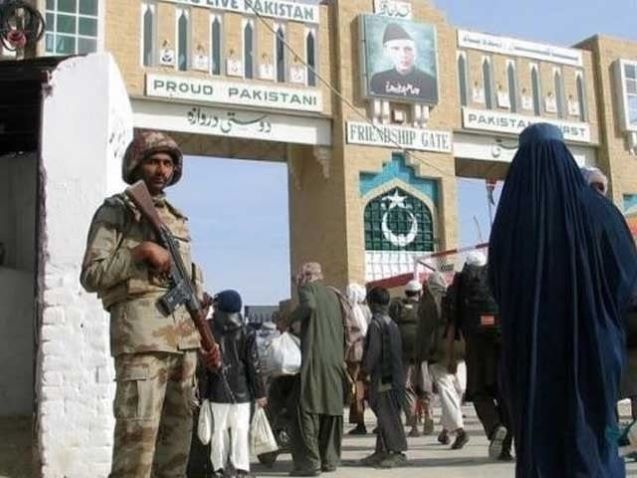Traders say over 70% of Afghan trasit trade through Pakistan has switched to the Chabahar Port route due to frustrations, fees and other issues on trading through Pakistan
As Kabul’s ties with Islamabad remain frosty, traders in Afghanistan have decided to pivot away from Pakistan and have started trading with and through Iran for its transit trade bound for India. Some traders have estimated that the volume of trade which has shifted away from Pakistan in the past two years is as high as 70%, biting deep into the embattled local economy.
The situation has been precipitated by the start-stop nature of transit trade through Pakistan owing to the security situation on the borders between Afghanistan and Pakistan and then between Pakistan and India. Moreover, with Iran, Afghan traders get comparatively speedy deposits, lower costs, and quick visa facilities.
With Afghan traders shifting towards Iran and Iranian products, Pakistan has not only lost out on the transit trade but also on exports to Afghanistan—a major market for Pakistani products. Previously, products manufactured in Pakistan would find a large market in Afghanistan. But this, too, has dwindled by as much as 80% over the past two years, traders claimed in background discussions with The Friday Times.
Shahid Hussain, the president of the Peshawar-based Sarhad Chamber of Commerce and Industry (SCCI) and who frequently trades with Afghanistan, told The Friday Times that, on average, around 70% of Afghan transit trade through Pakistan has been affected in the past two years.
He said that one of the biggest blows to the transit trade has been the expiration of the Afghanistan-Pakistan Transit Trade Agreement (APTTA). The subsequent failure of Islamabad and Kabul to renew this agreement has created significant hurdles in the transit trade.
“There is a need to renew the APTTA,” Hussain told The Friday Times, adding that the two neighbouring countries have been unable to evolve consensus over the 58 points agreement.
“A local [Afghan] trader is easily getting a visa for Iran in just 48 hours,” he said while dilating the difficulties faced by Afghan traders to visit Pakistan. He added that sometimes containers from Afghanistan bound for India —and vice versa — get stuck at dry docks and ports for nearly two weeks while awaiting clearance.
The bilateral trade agreement—APTTA—was signed by both countries in 2010. While the trade agreement has been extended as a provisional measure, neither side has broached the topic of renewing it or negotiating a new agreement that addresses the concerns of both sides. Pakistan has been reluctant to renew the agreement as long as the interim Afghan Taliban government remains in place, fearing the imposition of sanctions.
Another reason why many Afghan traders have switched to Iran is the lack of infrastructure in Pakistan. Around five years ago, the Asian Development Bank (ADB), in its report, had painted an alarming situation about the Pakistan-Afghanistan transit trade. ADN’s “CAREC Corridor Performance Measurement and Monitoring (CPMM) Annual Report 2019” stated that Pakistan has taken robust actions to improve the environment for transit trade, yet it faces severe challenges in reducing structural barriers for road transport that keep costs high.
Moreover, Pakistan has imposed a ban on certain items from being transported through the transit corridor and stringent conditions on other items. This action is believed to have caused Pakistan a loss of several hundred thousand US dollars amidst a challenging economic situation. The then-caretaker government justified the ban by arguing that these measures were necessary to combat illegal imports.
The bans came against the backdrop of the caretaker setup’s decision to expel illegal Afghans and thousands of refugees, which further frayed ties between the two neighbours.
The newly elected Pakistan Muslim League-Nawaz (PML-N) government has recognised the gravity of the situation, however. Last month, Pakistan and Afghanistan deliberated on trade matters in Kabul. Islamabad sent a delegation headed by Federal Commerce Secretary Muhammad Khurram Agha to hold talks with Afghan Commerce Minister Nooruddin Azizi.
The two sides discussed bilateral trade ties at length and how they have significantly deteriorated in the past two years due to frequent border skirmishes and the closure of vital crossing points along their shared border.
However, the breakdown in ties between Islamabad and Kabul allowed New Delhi and Tehran to step in and fill the vacuum.
It was reported that backed by a substantial investment of $35 million from India, Kabul recently inaugurated a commercial complex in Iran’s southern Chabahar Port. Iran and India jointly developed the Chabahar port to bolster bilateral trade, and it provides Kabul with an alternative to the transit trade routes through a volatile Pakistan.
What made things even more difficult was Pakistan’s decision last year to impose a processing fee on items imported under the Afghan transit trade agreement. Introduced through a Statutory Regulatory Order (SRO 1381 of 2023) issued for the Customs Department, the tax was calculated at 10% ad valorem based on the original value of goods and it must be paid in advance during the declaration process for Afghan transit commercial goods entering Afghanistan via Pakistan.
For Islamabad, the decision was aimed at deterring smuggling and ensuring the installation of a proper tax regime at a time when the government had asked all illegal immigrants, including 1.73 million Afghan nationals, to leave the country. Moreover, Islamabad believed that under the transit trade agreement, Pakistan had the right to impose a processing fee on cargo.
Across the Durand Line, however, the move was perceived as a U-turn by Islamabad on the Afghan transit trade and regional connectivity, and it was presumed that it could create a negative impact in an already tense situation. Several traders warned that the 10% tax would discourage traders.
Traders suggest that Islamabad and Kabul need to work together to develop a mutually acceptable framework with reasonable fees and charges and facilities for all those involved in transit or bilateral trade, enabling them to fully realise their trading potential.__The Friday Times Pakistan





